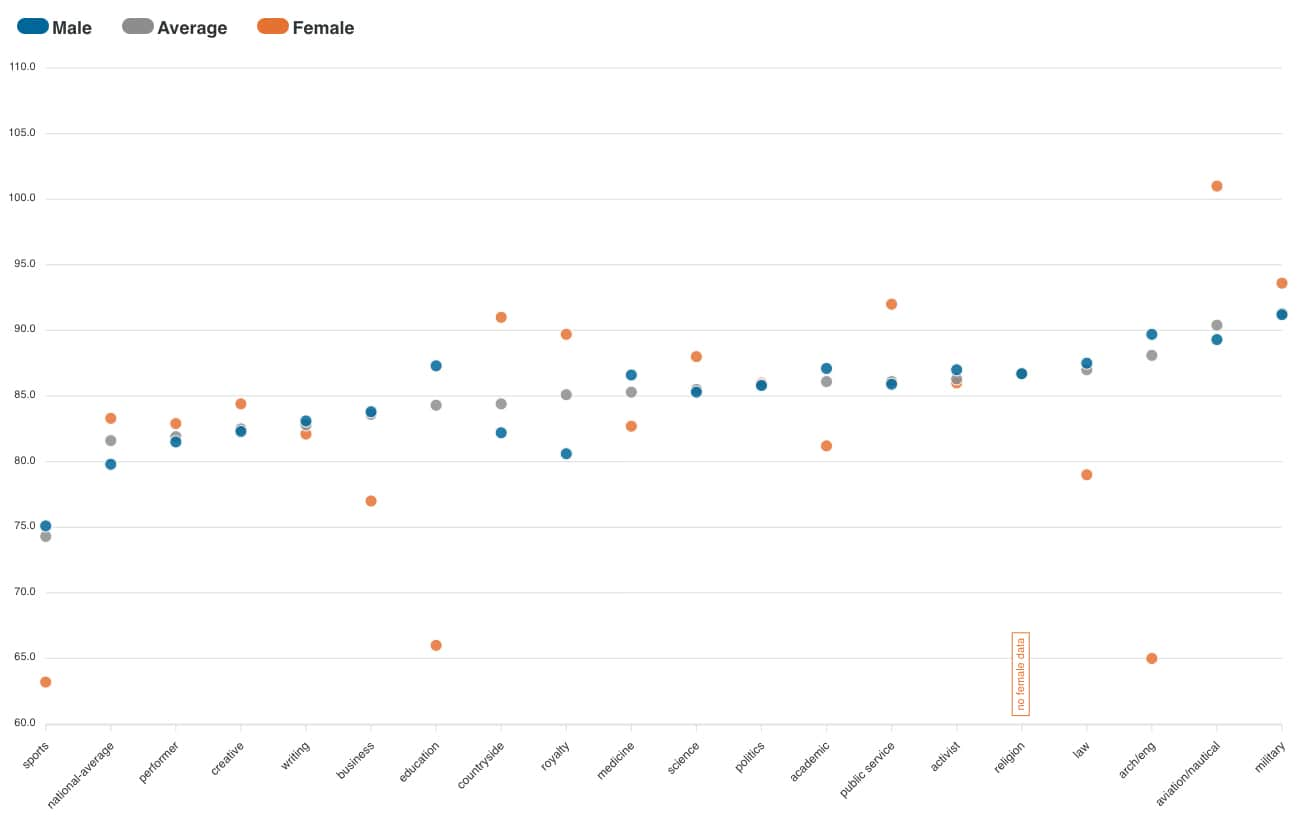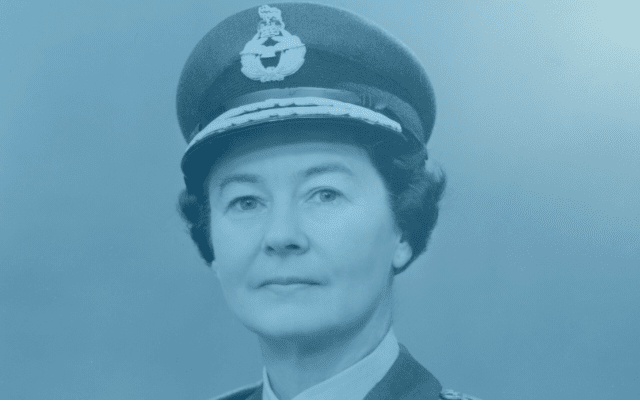Famous Lifespans:
The Price of Fame?
The fact that occupational factors can affect mortality have long been known. But are famous people
subject to the same trends as the rest of us?
Based on the idea that a person having an obituary in The Daily Telegraph implies a certain level of
fame or success, we used data from over 1,000 obituaries between 2016 and 2020 to find out.
Do super-healthy sports stars outlive us all? And does the stress of running the country send
politicians to an early grave? Find out below...
Age of Death by Occupation Category
Select a profession
- sports
- national-average
- performer
- creative
- business
- education
- royalty
- science
- academic
- public service
- religion
- arch/eng
- military
Military Supremacy
When all the data was analysed, we found some surprising results. If you want to have a long life, it looks
like the military is the career for you. Ex-servicemen and women had an average age of death of 91.2 and
93.6, respectively. Compare this to the national averages of 79.8 and 83.3 for men and women.
Male Lifespans
in Military
Male UK Life Expectancy 79.8
Male Average Age at Death for Military 91.2
Female Lifespans
in Military
Female UK Life Expectancy 83.3
Female Average Age at Death for Military 93.6
The subjects for this study are obviously not representative of the military as a whole, as they are skewed
towards the upper ranks. Nevertheless,
previous studies
have found a protective effect from military service that is not affected by rank.
A large part of this is likely due to the healthy worker effect.
This says that people able to work, especially in physically demanding jobs such as the armed forces, are
necessarily healthier than the population as a whole. And so, are expected to live longer.
Air Commodore Dame Felicity Hill was one of those
long-lived ex-Forces members. She joined the Women’s Air Auxiliary Force at the outbreak of the Second
World War and rose through the ranks quickly. Eventually, she became the first woman to hold the rank of
air commodore.
Female UK Life Expectancy 83.3
Female Average Age at Death for Military 93.6
Felicity Hill’s Age at Death 103
She died peacefully in January 2019 aged 103. In 50 years of retirement she wrote two novels and an
autobiography, as well as volunteering locally. Although she became increasingly frail and deaf as she
got older, she still kept her renowned sense of humour.
Athletes Live Faster
At the other end of the scale, sports stars live much shorter lives than you would expect. The average ages
of death for men and women in this category were just 75.1 and 63.2, respectively.
Lifespans for
Male Athletes
Male UK Life Expectancy 79.8
Male Average Age at Death for Athletes 75.1
Lifespans for
Female Athletes
Female UK Life Expectancy 83.3
Female Average Age at Death for Athletes 63.2
It’s possible that, despite the undeniable health benefits of playing sport, the demands of intensive
training and elite level performance comes at a cost. The type of sport may also play a role.
A contact sport such as football or rugby may affect its players’ lifespans through the extra physical
stresses involved. Football is the most common sport of the athletes analysed - 19 of the 89 sportspeople
were footballers.
In October 2019, a 22-month
University of Glasgow
research project found that former professional footballers are three and a half times more likely to suffer
from serious neurological diseases, such as Alzheimer’s and Parkinson’s. In the wake of this, the FA has
banned heading footballs
in training for children under 11.
Johan Cruyff was one of the obituaries analysed. He was one of the
greatest footballers in the world during the 1970s. Cruyff won European Footballer of the Year three
times, and lifted three consecutive European Cups with Ajax.
Male UK Life Expectancy 83.3
Male Average Age at Death for Athletes 93.6
Johan Cruyff’s Age at Death 68
He died in March 2016 aged 68 from lung cancer. Cruyff had been a heavy smoker since he was a boy,
smoking more than 40 cigarettes a day. He quit in 1991 after undergoing an emergency bypass operation,
but perhaps it was a case of too little, too late.
People who practise extreme or dangerous sports generally also have shorter lifespans than the general
population. Not one of these sportspeople from our research lived longer than 65. This will also drag
down the average.
Do Famous People Live Longer?
Finally, how do famous people compare to the UK as a whole? When all 1,034 obituaries were analysed, the
great and the good came out ahead. But only just.
Male UK Life Expectancy 79.8
Male Average Age at Death across All Categories 83.8
Lifespans for
Famous Women
Female UK Life Expectancy 83.3
Female Average Age at Death across All Categories 83.3
The average life expectancy of a UK citizen born today is 79.8 years for men and 83.3 years for women.
Unexpectedly, the average age of death for famous men in our study was older (83.8), and for women the same
(83.3), as these averages.
This discrepancy is best explained by the finding that, relative to men, women are significantly
over-represented in the sports, performer and creative categories. These proved in turn to be associated
with shorter lifespans. And women are under-represented in longer-lived categories such as military and
aviation/nautical.
This is interesting because women tend to live longer than men,
all other things being equal. A mixture of biological, behavioural and environmental factors seem to account
for a longer lifespan in women. But that is not the case here. Perhaps the price of fame for women is more
pronounced than it is for men.







